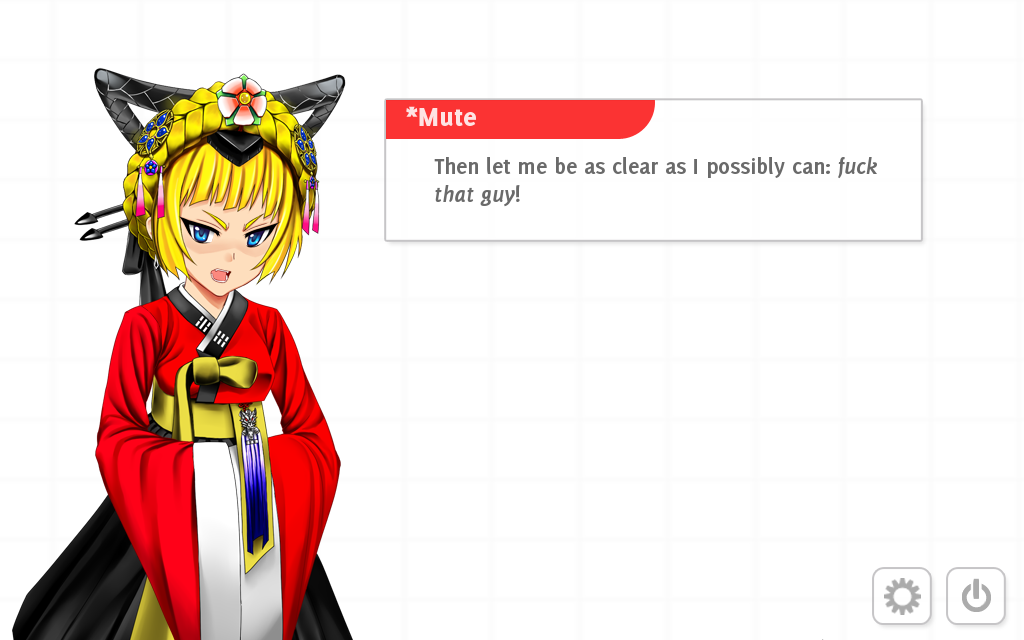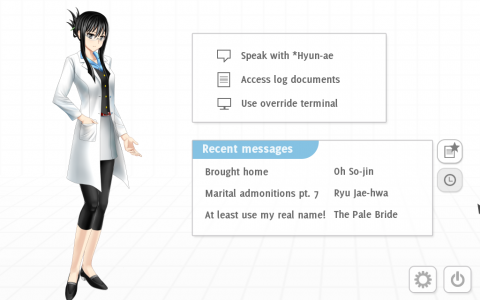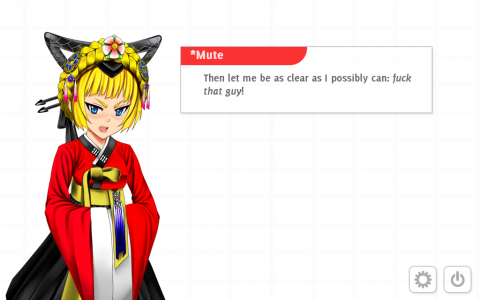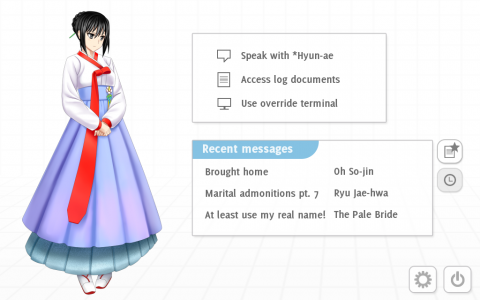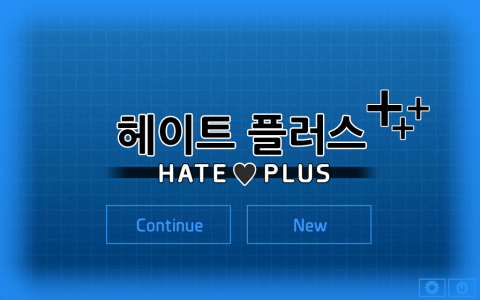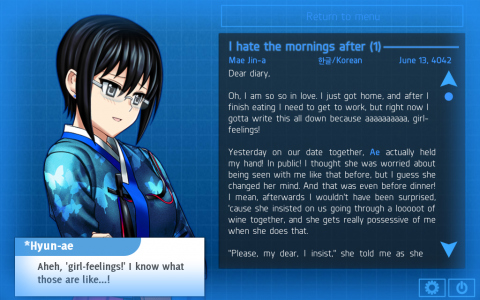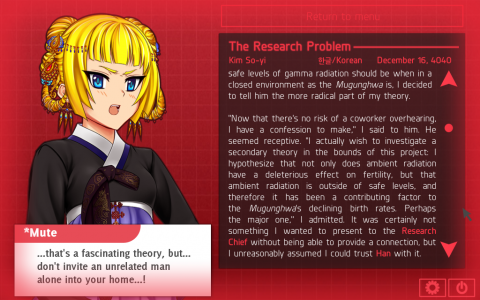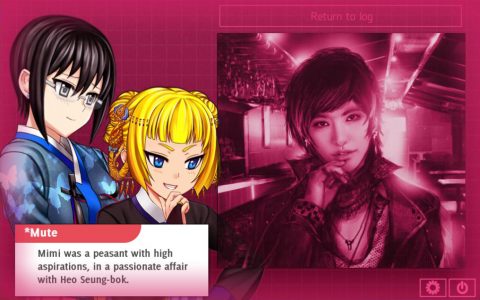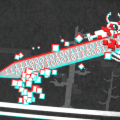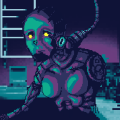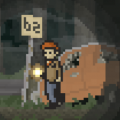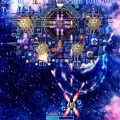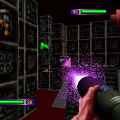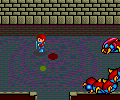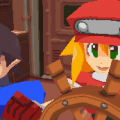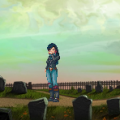
Love’s third major release was a more ambitious project than anything she had made up to that point. Analogue: A Hate Story was yet another spiritual successor to Digital, but even more so than Don’t take it personally. Analogue picks up on a lot of Digital‘s ideas and even mechanics (AIs, computer interfaces, ect), but this time in the far future, and focusing on a far darker story line, one you just happened to not be around for when it originally went down.
You play as an independent investigator who’s contacted by a friend to explore the Mugunghwa, a South Korean colonization ship that Earth lost contact with roughly six-hundred years ago. The job is to download the ship’s log files for the Saeju Colony Historical Society, using the ship’s security AI *Mute. However, *Mute isn’t functioning properly when you start up the computer, and you find an AI named *Hyun-ae instead. The computer’s interface is all but ruined, so you can only communicate with the AI via simple questions they pose to you and showing them log files to try and hint at other log files you wish to see, all while trying to figure out the admin password to download the whole log.

The mysteries of the Mugunghwa are far more surprising then anyone could have thought. Some sort of event caused all the ship’s clocks and calendars to reset to year one at some point, and civilization seemed to restart with them. Reading through some log files, you quickly discover that the society aboard the ship somehow became an oppressive patriarchy, and a young girl who was frozen with a then incurable disease was awakened into this time forcefully. Her name is the Pale Bride, and she’s at the center of what happened that caused the mass extinction event on the ship. You have to speak with both *Hyun-ae and *Mute to solve the mystery of the Mugunghwa (*Mute becomes available after some time spent with *Hyun-ae), although you’ll also have to deal with the mutual hatred the two seem to have for each other.
Characters
 *Hyun-Ae
*Hyun-Ae
The first AI you meet aboard the Mugunghwa. She’s very critical of the ship’s outdated society and has a lot of knowledge and hatred for one of the two major families from before the extinction event, the Kims. She’s incredibly affectionate towards you from the start, desperate for any sort of contact, and finds *Mute to be an obnoxious gossip.
 *Mute
*Mute
The ship’s security AI. She’s completely trenched in the customs of the Mugunghwa’s last civilization, but also has a habit of losing her cool and sharing gossip about the various people who used to populate the ship. She absolutely despises *Hyun-ae and the Pale Bride, but also has incredible knowledge of the second major family, the Smiths.
Analogue is both a step back and step forward from Don’t take it personally. The cast is dramatically smaller, with just you and the two AIs. Everyone else you read about is already long dead by the time you get there, but you get to read their diary entries and understand them on a much more personal level as a result. The time spent with *Hyun-ae and *Mute is also handled better, allowing both of them to get sizable amounts of development, depending on which route you take. Unlike the past few games, Analogue has different endings you can earn from meeting the proper requirements. You can either romance or bring *Hyun-ae along with you as your partner investigator, kidnap *Mute as per her suggestion, or leave the ship with the data without either of them. You can also get a harem ending that puts its tongue firmly in cheek, but doing so requires cheating with information from a previous play through. I’ve only heard of one person able to unlock the route on their first play, and even then I lack proof of the feat.

The game functions on a futuristic interface that stays close to the basic set-up of our own monitors. You can click through the various blocks of log entries and read them, with your given AI occasionally flashing a button on bottom when they have something to add. You can also present a log you’re reading for a reaction or to ask for more information on the log’s writer or a subject in said log, since it’s currently impossible to manually bring up and go through all logs. This is where some of the challenge comes from. You have to answer questions from the two AIs in certain ways to have them bring up new logs, or only show them certain logs at certain points to avoid an event where you have to try and stop a nuclear core reaction, which leads to a situation where you have to decide which of them dies in the end (this can only be undone in the harem ending). Outside this timed puzzle sequence, the game is simple and focused on trying to read cues from the AIs and learn the best way to communicate with them to find new information. Or, that’s at least one way to play.
The game’s real focus is not on a goal, but the story of the ship’s citizens and the AIs themselves. *Hyun-ae and *Mute each have their own sides of the same story, and they have different views of the various people who once populated the Mugunghwa. *Mute represents the conservative viewpoint, and *Hyun-ae represents the progressive view. Each of them react completely differently to the logs you read, but not always in the most expected ways. Each is also holding secrets, and figuring out those secrets and each other’s point of view leads to a greater understanding of the story.

Unless you’re really obsessive, Analogue will require multiple plays to get the whole story. You can figure out the extinction event at the end of either *Hyun-ae’s or *Mute’s path, but the details on the society that caused the event and the lives of the noble families require a bit more sleuthing. These details are what make Analogue so interesting, because all these side stories are even more compelling than the main mystery. Love didn’t back away from heavy subjects in this game either, choosing to build on themes she briefly brought up in Don’t take it personally, but not nearly with the same depth and weight.
Among the files include diaries from the Pale Bride, showing how she was a child once frozen and stuck in a new time that wrote in an entirely different language and had beliefs that contradicted everything she was taught, all while suffering from horrible illness. There’s a series of letters exploring an affair between two women with a particularly heart wrenching ending. You can see the fall of the Smiths and one of the few people *Mute truly respected. There are accounts from the women of this society that would shock modern audiences in how mistreatment and even abuse were received. Analogue takes heavily from real past societies, showing how frightening those times really were, especially with the Pale Bride’s ongoing culture shock. The amazing thing is that Love admitted that she downplayed a lot of the horrible behavior and beliefs she researched, simply so players could stomach it all.

The game’s presentation is also very impressive. The background music is very subtle and moody, fitting whatever log you’re reading or conversation you’re having. The futuristic holodeck style grid has a very sterile design, and it works very well as an interface background. It’s what you’d expect from computers in the future, based on modern sensibilities of simple and easy use. There’s sadly no voice acting, but both *Mute and *Hyun-ae are given their own little dialog and vocabulary quirks to make the text stand out. *Mute makes far more valley girl style shocked reactions, while *Hyun-ae has a habit of rambling while trying to make a point or deleting text before you can read an embarrassing confession from her. It’s all much less annoying than the use of text speak from Don’t take it personally, and fits the game far better. They’ll even react to you differently based on how you answer their questions, most notable *Mute when she thinks you’re a woman and not a man.
Getting all the endings only takes a few hours, especially if you save before questions that trigger an ending, but collecting all the logs is a much more difficult task. Overall, it should take about ten hours or so to find everything the game has to offer. Steam achievements are also pretty strange at times, especially one where you have to treat *Hyun-ae terribly for an entire game. It goes to show that Love’s sense of humor manages to seep its way into even extra challenges.
Analogue received mostly above average reviews from critics, but also earned lots of praise for its dark subject matter and how maturely it handled its story. As of December 2012, the game proved to be successful with the moving of 40,000 copies, a number that has only grown since then.
__________________________________________________

One of Love’s goals as a developer is to avoid making sequels and focus on new ideas and original stories. While every game up till this point was a spiritual successor of some sort, they all had stories that could stand on their own. Hate Plus is the black sheep in that regard. The game was originally supposed to be an expansion pack for Analogue that added more story, but the project quickly ballooned in development and Love felt the only way to make it proper was as a full fledged sequel. It certainly feels like a mix of expansion and sequel, especially with how the story itself plays out.
Hate Plus takes plays after the events of Analogue, where your character is traveling back to Earth with either *Mute, *Hyun-ae, or both of them. While on the way, one of them finds code from the Mugunghwa that contains log files from before the event that caused the entire ship to reset to year zero and brought rise to its backwards society. With nothing to do for three days, you and the AIs decide to go through the files and discover the truth of what caused things to go so wrong on the ship, discovering what *Mute was once like before year zero, and raising plenty of questions in the process.

Hate Plus is more of a tour than a game. Unlike Analogue, there’s no puzzle element from trying to find log files, as they’re all logged into your ship already, you just have to download them all over the course of three days. Choice also has less impact this time around. The game starts out with you choosing to continue a finished route from Analogue (minus the ending where you ride off alone), or allowing you to create a scenario from a series of choices that create one of the game’s three routes and decides their variables at play. Of course, that should only be done if your old saves were erased for some reason, as the game will make no sense to anyone coming in without playing Analogue first. The routes follow either going through files with *Hyun-ae, *Mute, or both of them from the harem ending. Each of these routes have different possible endings you can earn based on your choices, but they’re also far more on rails than Analogue was. Some events can’t be skipped or avoided, only the ending can be affected in transparent ways. That’s a bit of a shame, but it’s obvious the real focus went into the log files.
The log files this time around are massive compared to the files of the first game. They all detail the lives of the various people involved in the changing of the Mugunghwa’s rule, both large and small, and paint the picture of a world that was suffering from its own corruption that caused the hatred that lead to a massive change in power. While Analogue‘s log files focused on how horrible the world the Pale Bride lived in was, Hate Plus is more focused on the time of Old *Mute and the pros and cons of the culture before. It’s an interesting contrast, with a government system that already disadvantages anyone of lower class and is run by corrupt and scheming nobles, yet far more equal towards gender and sexuality than the culture that followed it. The slow change in the ship’s rule and values is well paced and filled with tragedy, including the fates of two homosexual couples, a female researcher’s troubled career and marriage, and the fall of the old council. However, it’s the ultimate fate of Old *Mute that’s the greatest tragedy.

Old *Mute is one of the most interesting figures Christine Love has ever written. She’s a tough, no nonsense woman of incredible political power who ultimately has the same core belief of the current *Mute, that being the safety of the ship and all of its passengers. When it comes to how that stability and safety should be reached, however, she’s on a completely different wavelength than *Mute. She’s a schemer who manipulates various council members to keep the ship stable and in a constant, unchanging form of government, putting down movements with double faced political plays instead of violent arms. However, her ultimate fall is handled with a similar strategy, and it comes with a bit of cruel irony. Her final log file, which can be read on the second day, explains just how the current *Mute came to be, and it’s a very difficult story to read. She does an act so unforgivable that not even herself can justify what she did.
Each of the routes have different sets of information and focuses. *Hyun-ae’s route is meant to finish her character development from the first game, drawing a parallel between her and the person responsible for what happened on the Mugunghwa. *Mute’s route has her learning the truth of her current existence and her entire worldview being challenged, while directly addressing the series running theme about the nature of love and hate. It arguably has the single best ending of all three routes, with the strongest character arc. Each route also closes off access to certain log files; *Mute’s logs from the early days of the Mugunghwa after year zero can only be found in her route, while the logs going into detail on the motivations of the main villain are reserved for *Hyun-ae’s route due to story related reasons. The harem route has all log files, however, but should only be played after going through the first two routes, as it references events from both in playful ways. The endings in this arc is ultimately the happiest, but it mentions outright that it’s the most hollow of the three routes. Despite that, the game doesn’t belittle you for picking it, making it just as valid as the other routes in its own way. It also ends with a catchy and silly theme song about love that works in technology puns. It’s cute.

There’s also a new feature when reading log files. Instead of showing files to your given A.I for commentary, they’ll be reading along with you on the side of the screen, commenting on whatever catches their interest. It’s used for a lot of character development, but also for some humor. The harem route is especially funny, as *Hyun-ae and *Mute tend to argue with each other, including one file that puts them on a tangent about *Hyun-ae’s obsession with manga and maids. It adds a lot to the experience, giving you the reactions of the characters in real time and giving them some more personality. This goes especially for *Mute, as you can see her own hypocrisy in finer detail, as she reacts to the two homosexual couples in completely different ways.
Hate Plus also experiments with immersion in two different ways. The most notable way is that the game is designed to be played over the course of three days in real time; your ship has limited power, so you have to shut down after downloading and reading so many log files. You can continue twelve hours later, which also doubles as to trigger certain story points that rely on your A.I companions having time to themselves. *Hyun-ae’s route also has an event on the third day where she’ll want you to bake her a cake, and I mean actually bake her a cake in real life. The game estimates about how long it takes for you to look for ingredients for a recipe she gives, along with baking time itself, so you can’t trick her out of the event. In fact, she’ll confront you over this if you do try and chew you out for treating this like a “tacky ero game” where you say the right things for a reward, demanding a little actual effort on your part in your relationship with her. As a funny side note, the Steam version has an achievement related to this event. If you take a picture of you eating cake with *Hyun-ae during this event, you can send it to the developer herself to earn said achievement. There’s also one impossible achievement that Final Fantasy fans will instantly recognize, so I’d advise you not check the achievements until you’ve finished *Mute’s route once. It’s a massive spoiler and an in-joke. There are also lots of in-jokes to Digital and Don’t take it personally, particularly one e-mail that brings up the setting of those two titles.
Hate Plus is definitely less of a traditional “game” than Analogue was, but it’s also far larger in the scope of its story. Love’s writing is really punched up here to deal with all sorts of interesting new angles and characters, all while blurring the line between you and your player character. Hate Plus even blurs the line of expansion and sequel, and it’s simply fascinating for it. This game needs to be played right after Analogue for full effect. It should be noted that the game is also far longer, due to the size of the log files, but that time spent is well rewarded.
